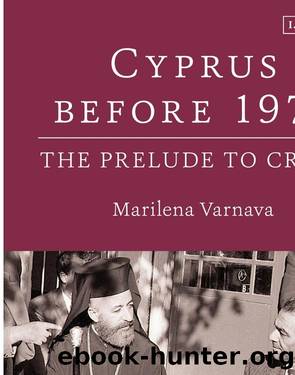Cyprus Before 1974 by Marilena Varnava;

Author:Marilena Varnava; [Неизв.]
Language: eng
Format: epub
Publisher: Bloomsbury UK
Policy of the âfeasibleâ and Elections, 1968
The first month of 1968 brought significant changes indeed to the islandâs affairs. Even though the âTCPAâ was established, the November crisis brought a striking wind of change. By 18 January almost all Greek troops had returned to Greece, and despite the announcement for the âTCPAâ, Makarios decided to implement the peace plan that he had previously announced on 24 December. Full freedom of movement and all other restrictions from 12 January were lifted from the Turkish-Cypriot-controlled areas, except Nicosia, which was the centre of the âTCPAâ, and the Kokkina enclave.60 On 12 January the president made the following famous declaration, âCourageous decisions and important initiatives are required if we are to break the present deadlock. A solution, by necessity, must be sought within the limits of what is feasible, which does not always coincide with the limits of what is desirable.â61 Presenting it as his own personal decision, this was the first time that Makarios implied openly that Enosis was no longer attainable and that his government would seek a solution on the basis of an independent, unitary state with a Charter of Rights for the Turkish Community. At the same time he declared that this new official direction of the government required a fresh mandate and thus presidential elections were to be held on 25 February 1968. Through these elections, Makarios sought to gain a clear and stronger mandate to use against those rivals who persisted in accusing him of mishandling the Cyprus problem and the Enosis goal. Consistent with his usual tactics, Makarios had not previously informed anyone about his decision to hold elections. The statement came as shock once again to his ministers and closest advisors who revealed that they knew nothing about this plan.62
This speech was perceived as marking a new, more conciliatory era for Cyprus not only because of this new direction but also because Makarios avoided using the term âminorityâ when referring to the Turkish-Cypriot rights. At this point it is worth noting the different approaches of the various ministers in Makariosâ Cabinet, as reflected through their private discussions with foreign officials. The Foreign Minister Kyprianou, as we have already seen, had been one of the hardliners of the government and tried to minimize the importance of characterizing the Turkish-Cypriots as a âcommunityâ, denying that it had any particular significance.63 Conversely, the Acting Foreign Minister, and Minister of Commerce, Andreas Araouzos, maintained that this reference was âdeliberately conciliatoryâ.64
Likewise, mixed messages were also coming from the Cyprus Government about the electoral law to be used in the forthcoming elections. Initially, Makarios was determined to implement the new legislation adopted in 1965, but Osorio-Tafall advised him that this would have been a dangerous development.65 The main concern was that if the new law was implemented, it would increase tension. Kyprianou, however, insisted that if the 1965 electoral legislation was not implemented, the Cyprus Government would be publicly humiliated by the fact that it was not consistent with its declarations of the last four years about removing all seeds of division incorporated in the constitution.
Download
This site does not store any files on its server. We only index and link to content provided by other sites. Please contact the content providers to delete copyright contents if any and email us, we'll remove relevant links or contents immediately.
| Africa | Americas |
| Arctic & Antarctica | Asia |
| Australia & Oceania | Europe |
| Middle East | Russia |
| United States | World |
| Ancient Civilizations | Military |
| Historical Study & Educational Resources |
The Battle of Mogadishu by Matt Eversmann & Dan Schilling(737)
The Confidence Men by Margalit Fox(694)
The Spymaster of Baghdad by Margaret Coker(661)
A History of the Muslim World since 1260: The Making of a Global Community by Vernon O. Egger(657)
Jack the Ripper and the East End by Peter Ackroyd(629)
Empire of Fear: Inside the Islamic State by Andrew Hosken(608)
The Afghanistan File by Prince Turki AlFaisal Al Saud(604)
The Crimean War by Winfried Baumgart(597)
Islam At The Gates: How Christendom Defeated the Ottoman Turks by Diane Moczar(594)
Akhenaten by Dominic Montserrat(587)
The Jerusalem Diamond by Noah Gordon(587)
Beirut 2020 by Charif Majdalani(577)
A Concise History of Greece (Cambridge Concise Histories) by Richard Clogg(572)
The History of Jihad by Robert Spencer(571)
Enemy in the East by Rolf-Dieter Müller(548)
Israel: Ancient Kingdom or Late Invention? by Daniel I. Block(545)
The Privatization of Israeli Security by Shir Hever(543)
Destroying a Nation: The Civil War in Syria by Nikolaos van Dam(538)
The Nine Lives of Pakistan by Declan WALSH(536)
